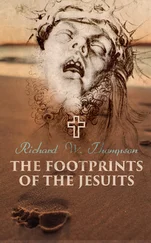Thomas Campbell - The Jesuits, 1534-1921
Здесь есть возможность читать онлайн «Thomas Campbell - The Jesuits, 1534-1921» — ознакомительный отрывок электронной книги совершенно бесплатно, а после прочтения отрывка купить полную версию. В некоторых случаях можно слушать аудио, скачать через торрент в формате fb2 и присутствует краткое содержание. Жанр: foreign_antique, foreign_prose, Историческая проза, на английском языке. Описание произведения, (предисловие) а так же отзывы посетителей доступны на портале библиотеки ЛибКат.
- Название:The Jesuits, 1534-1921
- Автор:
- Жанр:
- Год:неизвестен
- ISBN:нет данных
- Рейтинг книги:4 / 5. Голосов: 1
-
Избранное:Добавить в избранное
- Отзывы:
-
Ваша оценка:
- 80
- 1
- 2
- 3
- 4
- 5
The Jesuits, 1534-1921: краткое содержание, описание и аннотация
Предлагаем к чтению аннотацию, описание, краткое содержание или предисловие (зависит от того, что написал сам автор книги «The Jesuits, 1534-1921»). Если вы не нашли необходимую информацию о книге — напишите в комментариях, мы постараемся отыскать её.
The Jesuits, 1534-1921 — читать онлайн ознакомительный отрывок
Ниже представлен текст книги, разбитый по страницам. Система сохранения места последней прочитанной страницы, позволяет с удобством читать онлайн бесплатно книгу «The Jesuits, 1534-1921», без необходимости каждый раз заново искать на чём Вы остановились. Поставьте закладку, и сможете в любой момент перейти на страницу, на которой закончили чтение.
Интервал:
Закладка:
All ambition of ecclesiastical honors is shut off by a special vow to that effect. There is no choir or special dress. The poverty of the Society is of the strictest. The professed houses are to subsist on alms, and cannot receive even the usual stipends. Moreover, the professed are bound by a special vow to watch over and prevent any relaxation in this respect. The rule is paternal, and hence an account of conscience is to be made, either under seal of confession or in whatever way the individual may find most agreeable. A general congregation may be convened as often as necessary. Its advisability is determined at the meeting of the procurators. In the first part of the Constitution, the impediments and the mode of admission are considered; in the second, the manner of dismissal; in the third and fourth, the means of furthering piety and study and whatever else concerns the spiritual advancement, chiefly of the scholastics; the fifth explains the character of those who are to be admitted and also the various grades; the sixth deals with the occupations of the members; the seventh treats of those of superiors; the eighth and ninth relate to the General; and the tenth determines the ways and means of government. Before the Constitutions were promulgated, Ignatius submitted them to the chief representatives of the various nationalities then in the Order, but they did not receive the force of law until they were approved by the first general congregation of the whole Society. After that they were presented to Pope Paul III, and examined by four Cardinals. Not a word had been altered when they were returned. The Sovereign Pontiff declared that they were more the result of Divine inspiration than of human prudence.
For those who read these Constitutions without any preconceived notions, the meaning is obvious, whereas the intention of discovering something mysterious and malignant in them inevitably leads to the most ridiculous misinterpretations of the text. Thus, for instance, some writers inform us that St. Ignatius is not the author of the Constitutions, but Laínez, Mercurian or Acquaviva. Others assure their readers that no Pope can ever alter or modify even the text; that the General has special power to absolve novices from any mortal sins they may have committed before entering; that the general confessions of beginners are carefully registered and kept; that a special time is assigned to them for reading accounts of miraculous apparitions and demoniacal obsessions; that before the two years of novitiate have elapsed a vow must be taken to enter the Society; that all wills made in favor of one's family must be rescinded; that in meditating, the eyes must be fixed on a certain point and the thoughts centered on the Pater Noster until a state of quasi-hypnotism results; that the grades in the Society are reached after thirty or thirty-five years of probation, after which the applicant becomes a probationer; the professed are called "ours"; the spiritual coadjutors "externs." The latter do the plotting and have aroused all the ill-will of which the Society has been the object; whereas the professed devote themselves to prayer and are admired and loved.
There are also, we are assured, secret, outside Jesuits. The Emperors Ferdinand II and III, and Sigismund of Poland are put in that class, and probably also John III of Portugal and Maximilian of Bavaria; while Louis XIV is suspected of belonging to it. The Father-General dispenses such members from the priesthood and from wearing the soutane. "Imagine Louis XIV," says Brou, who furnishes these details, "asking the General of the Jesuits to be dispensed from wearing the soutane!" Unlike the other Jesuits, these cryptics would not be obliged to go to Rome to pronounce their vows. Again, it is said, Pope Paul IV had great difficulty in persuading the Jesuits to accept the dispensation from the daily recitation of the breviary. Perhaps the most charming of all of these "discoveries" is that the famous phrase perinde ac cadaver , "you must obey as if you were a dead body," was borrowed from the Sheik Si-Senoussi who laid down rules for his Senoussis in Africa, about two centuries after St. Ignatius had died. The authors of these extraordinary conceptions are Müller, Reuss, Cartwright, Pollard, Vollet and others, all of whom are honoured with a notice posted in the British Museum, as worthy of being consulted on the puzzling subject of Jesuitry, and yet the Constitutions of the Society and the explanations of them, by prominent Jesuit writers, can be found in any public library.
CHAPTER II
INITIAL ACTIVITIES
Portugal, Spain, France, Germany, Italy – Election of Ignatius – Jesuits in Ireland – "The Scotch Doctor" – Faber and Melanchthon – Le Jay – Bobadilla – Council of Trent – Laínez, Salmerón, Canisius – The Catechism – Opposition in Spain – Cano – Pius V – First Missions to America – The French Parliaments – Postel – Foundation of the Collegium Germanicum at Rome – Similar Establishments in Germany – Clermont and other Colleges in France – Colloque de Poissy.
The pent-up energy of the new organization immediately found vent not only in Europe but at the ends of the earth. Portugal gave its members their first welcome when Xavier and Rodriguez went there, the latter to remain permanently, the former only for a brief space. Araoz evangelized Spain and was the first Jesuit to enter into relations with Francis Borgia, Viceroy of Catalonia, who afterwards became General of the Society. A college was begun in Paris and provided with professors such as Strada, Ribadeneira, Oviedo and Mercurian. Faber accompanied Ortiz, the papal legate, to Germany; Brouet, Bobadilla, Salmerón, Codure and Laínez went everywhere through Italy; while Ignatius remained at Rome, directing their operations and meantime establishing orphanages, night refuges, Magdalen asylums, shelters for persecuted Jews, and similar institutions. Strangely enough, Ignatius was not yet the General of the Society, for no election had thus far taken place. Strictly speaking, however, none was needed, for none of the associates ever dreamed of any other leader. However, on April 5, 1541, the balloting took place; those who were absent sending their votes by messenger. That of Xavier could not arrive in time, for he had already left Portugal for the East; indeed he had departed before the official approval of the Order by the Pope – two things which have suggested to some inventive historians that Francis Xavier was not really a Jesuit. They would have proved their point better, if they could have shown Xavier had remained in Europe after he had been ordered away. As a matter of fact; he had been one of the collaborators of Ignatius in framing the Constitutions and was still in Portugal when the news arrived of Guidiccioni's change of mind.
In the election every vote but one went for Ignatius. The missing one was his own. He was dissatisfied and asked for another election. Out of respect for him, the request was granted but with the same result – Such a concession, it may be noted, is never granted now. The one who is chosen submits without a word. The office is for life but provisions are made for removal – a contingency which happily has never arisen. As in the beginning, those elections are held at what are called general congregations. The first one was made up of all the available fathers but at present they consist of the fathers assistant, namely the representatives of the principal linguistic groups in the Society or their subdivisions – a body of men who constitute what is called the Curia and who live with the General; the provincials; two delegates from each province; and finally the procurator of the Society. With one exception, these congregations have always met in Rome; the exception is the one that chose Father Luis Martín in 1892, which assembled at Loyola in Spain. That these elections may be absolutely free from all external and internal influence, the delegates are strictly secluded, and have no communication with other members of the Society. Four days are spent in prayer and in seeking information from the various electors, but the advocacy of any particular candidate is absolutely prohibited. The ballot is secret and the voting is immediately preceded by an hour's meditation in presence of the crucifix. The electors are fasting, but the method of voting is such that a deadlock or even any great delay is next to impossible. Up to the time of the Suppression of the Society in 1773, there had been eighteen Generals. In the interim between that catastrophe and the re-establishment, there were three Vicars-General, who were compelled by force of circumstances to live in Russia. In 1802 on the receipt of the Brief "Catholicæ Fidei," the title of the last Vicar was changed to that of General. Since then, there have been eight successors to that post.
Читать дальшеИнтервал:
Закладка:
Похожие книги на «The Jesuits, 1534-1921»
Представляем Вашему вниманию похожие книги на «The Jesuits, 1534-1921» списком для выбора. Мы отобрали схожую по названию и смыслу литературу в надежде предоставить читателям больше вариантов отыскать новые, интересные, ещё непрочитанные произведения.
Обсуждение, отзывы о книге «The Jesuits, 1534-1921» и просто собственные мнения читателей. Оставьте ваши комментарии, напишите, что Вы думаете о произведении, его смысле или главных героях. Укажите что конкретно понравилось, а что нет, и почему Вы так считаете.












